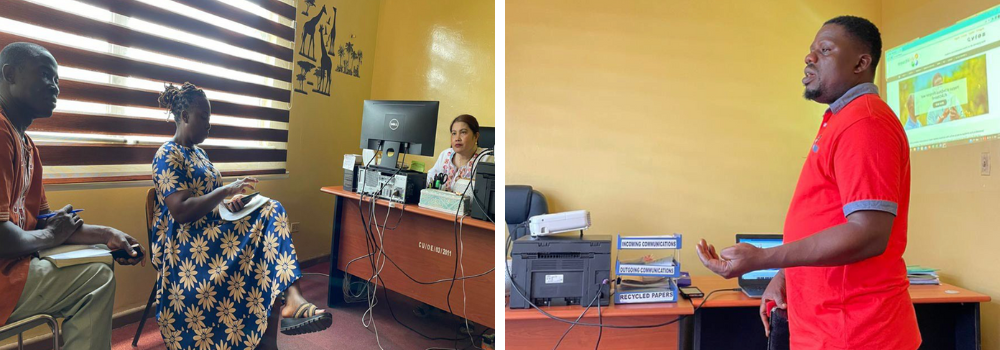The transformative impact of Research4Life in Liberia
In Liberia, where research infrastructure and access to academic resources are often limited, Stephen S. Browne, the Research4Life Country Connector, has been working tirelessly to change this. His efforts have provided students and faculty with the tools they need to succeed, creating a ripple effect of positive change across the academic landscape.
A glimpse into Liberia’s academic landscape
As of July 2024, Liberia has 80 accredited institutions spread across 11 counties. These include 13 public, 32 private, and 35 faith-based institutions, offering a range of academic programs from associate degrees to master’s degrees. Despite this educational diversity, the country faces significant challenges such as limited internet penetration (only 30.1%) and a high maternal mortality rate of 994 per 100,000 live births. The lack of developed infrastructure, especially road infrastructure, makes local support crucial for continued outreach and development.

Capacity building leads to publication success
The journey towards enhancing academic resources began in 2015 with the first Research4Life workshop in Monrovia. But it’s only by 2022, with the introduction of Country Connectors program, that progress was more significant. A notable example of this impact is at the African Methodist Episcopal (AME) University, the second largest college in Liberia. Before 2022, the university had no publications from staff or students. A workshop held in 2022 with thesis supervisors and senior students changed that narrative: by 2023, AME University had 24 journal articles published in international journals by both staff and students.
S. Mixillanean Jeromes, Jr., a university instructor and researcher at AME University, shared how the Research4Life training transformed his academic journey. “Prior to attending Research4Life training, I struggled with effectively navigating the complex landscape of academic research and scholarly publishing. I often felt overwhelmed by the vast array of resources available and uncertain about the best strategies to identify relevant literature, craft impactful research proposals, and disseminate my findings,” Jeromes explained. “The Research4Life training program has been transformative for me. It has equipped me with essential knowledge and skills, empowered me to better support my students and the academic community, and enabled me to make more meaningful contributions to advancing research and addressing societal needs. I am deeply grateful for the opportunities provided by this invaluable program.”
Overcoming infrastructure challenges
In 2024, Liberia witnessed significant strides in research output. Three major Research4Life workshops were held, including a notable one at Cuttington University, the oldest private institution in sub-Saharan Africa, with 75 participants. These workshops were critical in equipping lecturers, administrators, librarians, and health practitioners with the skills needed to navigate academic research.
At Cuttington University, the library had been allocated just two hours of electricity a day and had no internet access at the time of the visit. There were more than 20 computers in the lab, but these had not been used for over a year. And at the Central Agriculture Research Institute (CARI), which houses some of the best agricultural researchers in the country, there were no administrative staff onsite due to strike actions.
During their visits, the Research4Life team met with executive management, trained users and potential users, and identified challenges and gaps. Stephen’s advocacy at Cuttington University led to the library being equipped with computers, internet access, and a backup electricity supply.
Building a research-friendly environment and reaching remote areas
Collaboration with local, regional and international stakeholders has been key to overcoming Liberia’s infrastructure challenges – and building the social infrastructure to support the physical gaps and achieve better research ecosystems.
Capacity-building events were held in collaboration with the Institute for Global Health, JFK Medical Centre, and the Liberia Library Association, significantly increasing knowledge and skills among medical and health professionals. In July, outreach activities at the National Public Health Institute of Liberia and the United Methodist University gathered valuable insights to develop strategies for enhancing Research4Life usage.
Despite political and security concerns during the 2023 general and presidential elections, the outreach did not stop. The Country Connector undertook a challenging journey through neighboring Côte d’Ivoire to reach Southeastern Liberia. At Tubman University, which houses cocoa, cassava and palm fruit farms as research areas for the College of Agriculture and Food Science, a presentation by FAO colleagues focused on AGORA, AGRIS, and AGROVOC, highlighting the potential for agricultural research in the region.
The road ahead
Stephen S. Browne’s efforts have laid a strong foundation for a more research-friendly environment in Liberia. His work underscores the importance of continued support and investment in programs such as the Country Connectors. As these initiatives continue to grow and evolve, they pave the way for a brighter, more informed future for the country, one where every academic and researcher has the tools they need to succeed and make meaningful contributions to society.











